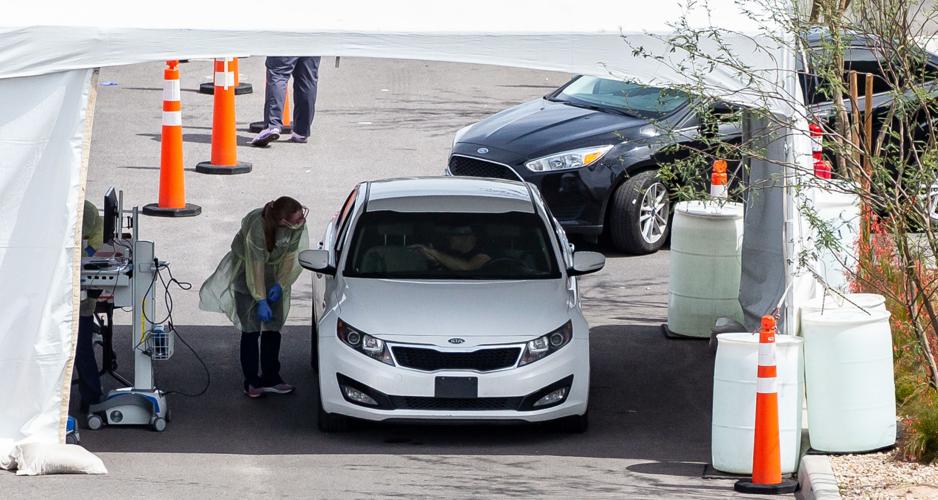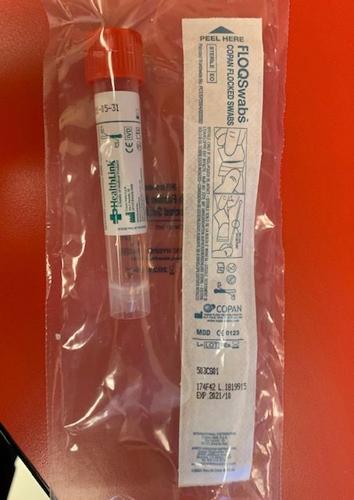The state health department website will now include more data about the COVID-19 outbreak.
The Arizona Department of Health Services launched a new dashboard Sunday on its website to include more data on confirmed cases and on commercial testing to better track how the outbreak is evolving, the department said in a news release.
There are now two sections of the dashboard. The first section contains data about confirmed cases including the number of cases, deaths, cases by county, week, age and gender.
The second section includes additional data about testing broken down into similar groups as the confirmed cases data. The second section also shows the percentage of tests where COVID-19 was detected and non detected.
On Monday, March 23, Arizona Governor Doug Ducey issued an executive order requiring commercial labs to report all COVID-19 results. The state health department updates the data every day at 9 a.m.
People are also reading…
The data and more information about the COVID-19 outbreak in Arizona can be found at azhealth.gov/COVID19.
As of Sunday morning, the state reported 919 confirmed cases of COVID-19 and 17 deaths caused by the virus. Private testing labs and the state public health lab have collectively conducted 13,872 coronavirus tests.
The first known positive case in the state was on January 26 and the rate of cases has increased since then, with 857 of the 919 confirmed cases coming from tests in the last two weeks, since March 15. Testing has also increased in the last two weeks, with 5,797 tests conducted the week of March 22 and 6,850 tests conducted the week of March 15.
"With widespread community transmission of COVID-19, and increased testing, ADHS expects to see more cases of COVID-19 in Arizona," the health department said in a news release. "COVID-19 is highly contagious and can be fatal. It is imperative that everyone takes precautions to protect themselves and their friends and family from this disease."
Despite increased testing, Arizona health department officials have said widespread testing is not critical in assessing the COVID-19 crisis.
Earlier this month Jessica Rigler, assistant director of public health preparedness for the Arizona Department of Health Services, said there are other factors utilized without the widespread testing.
These include daily assessments of hospital admissions, what’s being seen in emergency rooms, daily bed and ICU capacity in each hospital and reports of influenza-like illnesses.
“While Arizonans don’t need to panic, they do need to be concerned about the spreading of this disease,” Rigler said. “The absence of testing does not mean an absence of data. All of the other indicators help us understand what’s going on in the state.”
Photos for March 27: Tucson gets by during coronavirus pandemic
Tucson, coronavirus, tattoos

The doors are still open at Sacred Art Tattoo on 1024 E. 6th St., as of Friday, March 27, 2020, Tucson, Ariz.
Tucson, coronavirus

Seth Nadeau, left, and his son Anthony Nadeau get out of the house for a couple of game so horse under cloudy skies on the courts at Christ Church United Methodist, March 27, 2020, Tucson, Ariz.
Tucson, coronavirus

Victoria Quintero, 5, holds her sign as her mother, Vanessa, waves to the teachers and administrators from John E. White Elementary School and Pistor Middle School during a Car Parade through the neighborhood on March 27, 2020. The teachers and administrators drove their cars through the neighborhood to say hello to their students from their cars.
Tucson, coronavirus

Teachers and administrators from John E. White Elementary School and Pistor Middle School cheer and wave to their students during a Car Parade through the neighborhood on March 27, 2020. The teachers and administrators drove their cars through the neighborhood to say hello to their students from their cars.
Tucson, coronavirus

Standing, Kai Morales, left, and his twin brother, Kristian, hold up their signs as Karim, 9, and their mother, Angelica, sit in the bed of the truck along W. Nebraska Street during a Car Parade on March 27, 2020. The teachers and administrators drove their cars through the neighborhood to say hello to their students from their cars.
Tucson, coronavirus

Students of John E. White Elementary School and Pistor Middle School stand along W. Nebraska Street and wave to their teachers during a Car Parade on March 27, 2020. The teachers and administrators drove their cars through the neighborhood to say hello to their students from their cars.
Tucson, coronavirus

Teachers and administrators from John E. White Elementary School and Pistor Middle School line up along W. Canada Street before the start of their Car Parade on March 27, 2020. The teachers and administrators drove their cars through the neighborhood to say hello to their students from their cars.
Tucson, coronavirus

The noted bull testicles on the statue outside Casa Molina at Speedway and Wilmot, usually painted in various schemes and wild colors, now sporting a surgical mask.
Tucson, coronavirus

Pfc. Gustavo Escalera, of the Arizona National Guard, waves in the next car to his station at the Southern Arizona Community Food Bank on March 27, 2020. The Arizona National Guard has been activated to help the demanding need to fill and handout food boxes for people in Tucson and five counties in southern Arizona. Thirty troops arrived in Tucson on Thursday and another thirty are expected. According to Spc. John Randall, the troops are here to fill in the gaps in logistics to help keep up the production of putting together and handing out food boxes.
Tucson, coronavirus

Spc. Nicholas McCormick, of the Arizona National Guard, waits for the next car to pull up at the Southern Arizona Community Food Bank.
Tucson, coronavirus

Spc. Emilio Maldonado, of the Arizona National Guard, pushes a several bags down an assembly line at the Community Food Bank of Southern Arizona on March 26, 2020. The Arizona National Guard has been activated to help the demanding need to fill food boxes for people in Tucson and five counties in southern Arizona.
Tucson, coronavirus

Spc. Gabriel Molina, of the Arizona National Guard, fills bags with food items on an assembly line at the Community Food Bank of Southern Arizona on March 26, 2020. The Arizona National Guard has been activated to help the demanding need to fill food boxes for people in Tucson and five counties in southern Arizona.
Tucson, coronavirus

Hoover Zhu, owner of Old Peking, poses for a portrait inside a closed Old Peking at Old Peking , 2522 E. Speedway Blvd., in Tucson, Ariz., on March 25, 2020. Zhu closed Old Peking on Thursday March 25 due to the Coronavirus Disease (COVID-19).
Tucson, coronavirus

Chef Du Liyuan makes a take out order at Chef Wang, 356 E. Grant Rd., in Tucson, Ariz., on March 25, 2020. Chef Wang, a local Chinese restaurant, is open for take out but is considering closing due to the Coronavirus Disease (COVID-19).
Tucson, coronavirus

Before Tuesday’s change in policy, Arizona residents traveling to New York had to quarantine for 14 days. New Jersey and Connecticut also removed their travel restrictions.
Tucson, coronavirus

An empty baggage carousel at the Tucson International Airport, on March 26, 2020.
Tucson, coronavirus

Wendy Fu, owner of Chef Wang, processes a take out order at Chef Wang, 356 E. Grant Rd., in Tucson, Ariz., on March 25, 2020. Chef Wang, a local Chinese restaurant is open for take out but is considering closing due to the Coronavirus Disease (COVID-19).
Tucson, coronavirus

Chairs tilted in on tables at La Cocina located at 201 N. Court Avenue, on March 26, 2020.
Tucson, coronavirus

Sun sets over a dark and locked Hi Corbett Stadium, home to the Arizona Wildcats baseball team, as the city begins its second week under COVID19 restrictions, March 26, 2020, Tucson, Ariz.
Tucson, coronavirus

Downtown Congress Streets is mostly deserted just before 8 p.m. as the city begins its second week under COVID19 restrictions, March 26, 2020, Tucson, Ariz.
Tucson, coronavirus

The lanterns from the Reid Park Zoo's Asian Lantern Festival sit in a fenced compound after the zoo's closure ended the display weeks early as the city begins its second week under COVID19 restrictions, March 26, 2020, Tucson, Ariz.
Tucson, coronavirus

Residents stay spaced while out getting some air and watching the Rillito River flow near Craycroft as the city begins its second week under COVID19 restrictions, March 26, 2020, Tucson, Ariz.
Tucson, coronavirus

Jayden Simmons, right, 12, runs football drills with coach Bobby Rodriguez, owner of Jet Sports Training, at Silverlake Park, in Tucson, Ariz., on March 25, 2020. Due to gyms being closed, Rodriguez is taking classes and training outside to parks with little to no equipment.
Tucson, coronavirus

A man wearing a mask watches traffic go by while waiting for the bus on N. Alvernon Rd., in Tucson, Ariz., on March 25, 2020.
Tucson, coronavirus

Gloves, a mask and hand sanitizer sit on the counter at Chef Wang, 356 E. Grant Rd., in Tucson, Ariz., on March 25, 2020. Chef Wang, a local Chinese restaurant is open for take out but is considering closing due to the Coronavirus Disease (COVID-19).
Contact reporter Stephanie Casanova at scasanova@tucson.com. On Twitter: @CasanovaReports












